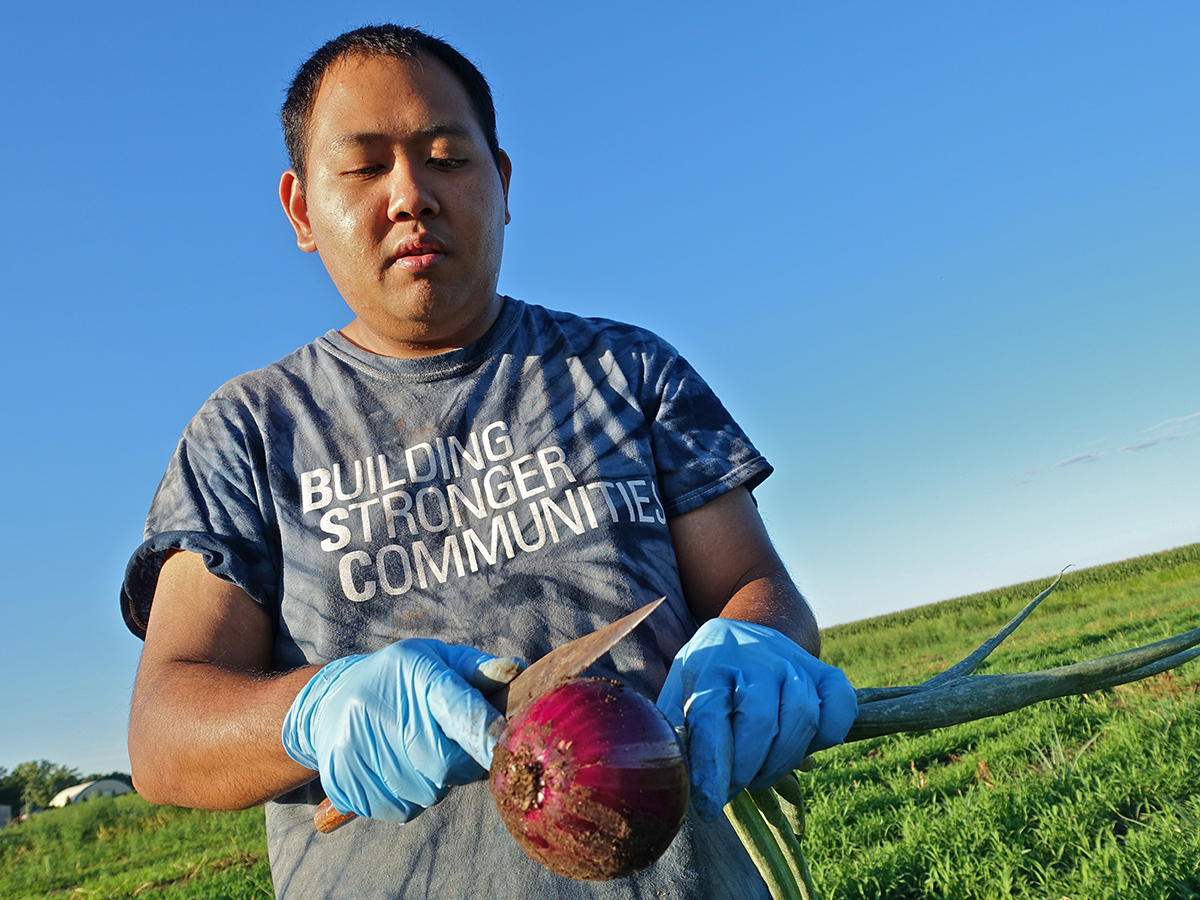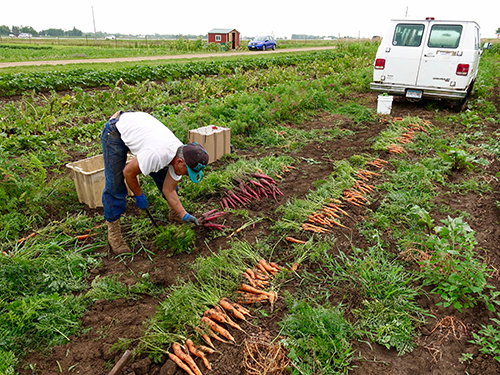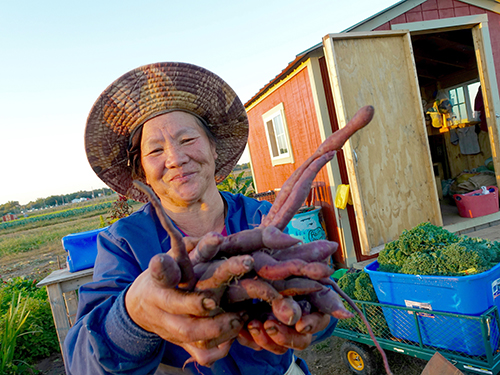Carleton College’s Relationship with Local Hmong Farmers Bears Powerful Fruit
- by Guest

A Hmong farmer cuts a red onion off its stalk
Despite the fact that Hmong American agrarians are integral to Minnesota’s local food movement and account for more than 50% of vegetable producers at Twin Cities farmers’ markets, they were until recently largely uncelebrated, unsupported, and misunderstood.
“Because of language barriers and unfamiliarity, and probably a little bit of racism, Hmong farmers haven’t had access to land, larger markets, or any of the capital and credit that’s prevalent in agriculture,” says Pakou Hang, executive director of Hmong American Farmers Association.
In 2011 Pakou and her brother Janssen Hang cofounded HAFA with a mission to “advance the prosperity of Hmong American farmers through cooperative endeavors, capacity building, and advocacy.” In practice, this has meant helping members unearth lucrative markets and deepen their understanding of small business management. Two years later, HAFA recruited a benefactor, who purchased 155 acres in Vermillion Township and created an agricultural land trust, ensuring that farmers who qualify get a 10-year lease. Two dozen small red toolsheds are complemented by two greenhouses, a machine shed, a brand-new pack shed, and a dilapidated but still functional country house turned makeshift office space.

Nineteen Hmong families are currently each renting one or two 5-acre plots from HAFA, growing carrots, potatoes, onions, and more for Carleton College, St. Olaf College, and other buyers
Once the farm was working, HAFA began to forge a deep, mutually beneficial relationship with Bon Appétit Management Company, the dining services provider at Northfield, MN-based Carleton College (and others). It was just the sort of alliance Pakou and her colleagues were looking to build, since it provided their members access to a large, nationally recognized vendor and simultaneously created an opportunity for them to engage in wider conversations on campus and at farm-sponsored events about issues such as economic equity, racial justice, and the importance of local agriculture.
“It’s a very substantive multipronged relationship,” Pakou says. “We are able to sell a substantial amount of produce to Carleton, but we also show students how the complexities of the food system reflect the complexities of Hmong farmers’ lives, which are layered with misperceptions, curiosity, and struggle. It’s a fullcircle thing, because in order to lift up Hmong farmers, you have to tell their stories to people who will share them with people in the wider community.”
As a first-year student, Claire Kelloway ‘16 found her way to Carleton’s Center for Community and Civic Engagement and discovered the Real Food Challenge, a national nonprofit focused on encouraging colleges to buy meat and produce from local, ecologically sound, humane sources. Later, she attended the group’s national conference, where Pakou gave a keynote speech. Claire returned to campus committed to creating an alliance between HAFA and Bon Appétit.
“I was already interested in the idea that entities we don’t usually think about, like college cafeterias, can be vehicles for change,” she says. “Pakou’s presentation impressed on me the importance of paying special attention to marginalized communities that play a huge part in our local food system.”
Bon Appétit proved to be the perfect partner. Claire, who already was managing Carleton’s Real Food Calculator — an online instrument that tracks institutional purchasing patterns — approached General Manager Katie McKenna. Always looking to diversify the college’s local supply chain, Katie was on board from the word go.
“Bon Appétit is dedicated to being a model for change,” says Claire, who spent the first two years after she graduated from Carleton working for Bon Appétit as a Fellow. “They not only support smaller producers who have been cut out of large, concentrated supply chains, they also leverage those producers’ purchasing power, which influences larger institutions that may not be as educated [about small farms and sustainability] as they could be.”

The Hmong farmers each get a shed to store their tools
Katie and former Carleton Executive Chef Gibson Price negotiated terms in 2017 for HAFA farmers to provide root vegetables to Carleton, with a heavy emphasis on yellow onions. It was a transformative contract. Farmers who had previously relied exclusively on seasonal sales learned how to cure their vegetables for year-round use, which provided them with more economic security and the ability to buy seeds and plan crop rotations in advance. Forging a relationship with a national vendor and a prestigious college also augmented HAFA’s reputation, opening doors to both local lenders and prospective clients.
“Our contract with Carleton was one of the main motivators for us to embark on a million-dollar project to build a new rinse, wash, cutting, and cooling facility,” Pakou says. “Our hope was that the expansion would lead to other similar contracts so our farmers could really invest in their future. And that’s exactly what happened.”
In 2018 HAFA sold some 10,000 pounds of produce to Carleton, mostly cured onions and potatoes. It also secured contracts to provide vegetables to the Minneapolis Public Schools, Lunds & Byerlys grocery stores, and Surly Brewing. As sales increase, Pakou remains loyal to the college that set the wheels in motion, encouraging Carleton students to visit the farm, offering to speak with classes and student groups, and hiring interns from both Carleton and St. Olaf College, which is also served by Bon Appétit.
Adapted with permission from an article written for the Carleton Voice by David Schimke, Managing Editor. Photos by Mike Hazard ’73.